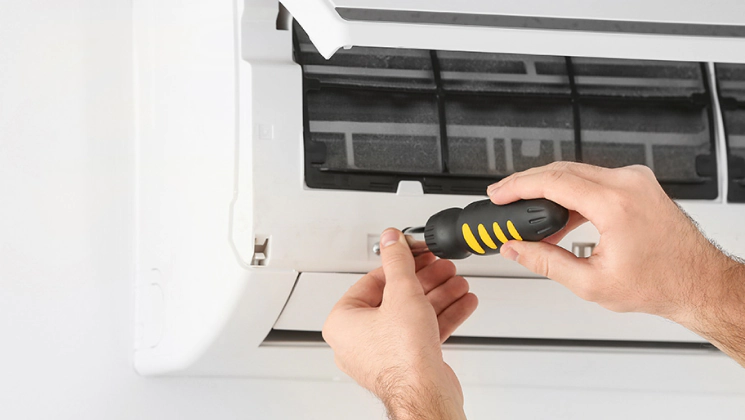
-
Powell Heating and Cooling team
-
Uncategorized
-
0 Comments
-
April 10, 2024
Don’t Hibernate Your AC: Top Reasons for Winter AC Repair
As the winter chill sets in, many homeowners tend to overlook their air conditioning systems, assuming they can take a well-deserved break until the warmer months return. However, this common misconception can lead to significant issues down the line. Contrary to popular belief, AC maintenance remains essential even during the colder seasons.
In our introduction to the importance of winter AC repair, we aim to dispel this misconception and shed light on why neglecting your air conditioner during winter can be a costly mistake. While it’s tempting to focus solely on heating systems during colder weather, your AC still plays a crucial role in maintaining indoor air quality and comfort.
During winter, AC systems can encounter a variety of issues that may go unnoticed until they escalate into larger problems. From frozen components to thermostat malfunctions exacerbated by fluctuating temperatures, neglecting winter AC maintenance can lead to reduced efficiency, increased energy bills, and even system breakdowns.
In this blog, we’ll provide a comprehensive overview of the common winter AC issues homeowners may encounter and highlight the importance of scheduling timely repairs. By understanding the significance of winter AC maintenance, you can ensure your system remains in top condition year-round, saving you both time and money in the long run.
Common Winter AC Issues
During the winter months, your air conditioning system may encounter a variety of issues that necessitate prompt attention. Despite the colder temperatures, AC systems can still face operational challenges due to factors like fluctuating indoor temperatures and reduced usage.
In our exploration of common winter AC issues, we’ll delve into why these systems may still require repair during the colder months. Even though cooling may not be a top priority, your AC continues to play a vital role in maintaining indoor air quality and humidity levels.
Winter conditions can exacerbate existing AC issues or give rise to new ones. From frozen coils and refrigerant leaks to malfunctioning thermostats and electrical problems, neglecting winter AC maintenance can lead to discomfort and inconvenience when you least expect it. By identifying these common issues and understanding their causes, homeowners can take proactive steps to address them and ensure their AC systems remain reliable throughout the winter season.
Frozen Components and Airflow Problems
As temperatures drop during the winter months, your air conditioning system faces unique challenges that can affect its components and overall performance. In this section, we’ll explore how cold weather impacts AC systems and why it’s essential to address these issues promptly.
Firstly, cold weather can cause certain AC components to function less efficiently or even malfunction. For example, refrigerant lines and coils may become prone to freezing, hindering the heat exchange process essential for cooling. Additionally, low temperatures can cause rubber seals and gaskets to harden or crack, leading to refrigerant leaks and decreased system efficiency.
Secondly, airflow restrictions can significantly impact AC performance during winter. Snow accumulation around outdoor units or debris buildup in vents and ducts can restrict airflow, preventing proper heat exchange and reducing system efficiency. Moreover, ice formation on outdoor units can further impede airflow and strain the compressor, potentially leading to premature wear and tear.
Thermostat Malfunctions and Electrical Problems
During winter, thermostat malfunctions and electrical problems can wreak havoc on your air conditioning system, leading to discomfort and potential damage. Let’s delve into these issues to understand their impact and why addressing them is crucial.
Firstly, thermostat malfunctions can cause temperature inconsistencies, leaving you feeling either too warm or too cold despite adjusting the settings. This can stem from faulty wiring, sensor issues, or simply an outdated thermostat unable to accurately gauge indoor temperatures.
Secondly, cold weather can exacerbate electrical problems within your AC system. Components such as capacitors, contactors, and wiring may experience increased strain, leading to malfunctions or failures. For instance, capacitors can struggle to start the compressor in low temperatures, resulting in system breakdowns. Similarly, contactors may become stuck or fail to engage properly due to cold-induced stiffness.
These thermostat and electrical issues not only compromise comfort but also pose safety risks and potential damage to your air conditioning system if left unaddressed.
Refrigerant Leaks and Condensation Concerns
Refrigerant leaks and condensation concerns are two critical issues that can arise with air conditioning systems during the winter months. Let’s take a closer look at these problems and why they demand attention.
Refrigerant leaks can occur due to various factors, including corrosion, vibration, or wear and tear on components. In winter, detecting these leaks can be challenging as the refrigerant pressure decreases in colder temperatures, potentially masking the signs of leakage. However, common indicators include reduced cooling efficiency, ice buildup on the outdoor unit, or hissing sounds near the refrigerant lines.
Condensation-related issues also become more prominent during winter. As warm indoor air interacts with cold surfaces, such as ductwork or uninsulated pipes, condensation can form. This moisture accumulation can lead to mold growth, wood rot, or corrosion, posing health risks and structural damage to your property if left unchecked.
Importance of Timely Repairs
Neglecting winter AC repairs can result in a myriad of consequences, including decreased efficiency, increased energy bills, and potential system breakdowns. Restricted airflow, thermostat malfunctions, and refrigerant leaks can worsen over time if left unaddressed, leading to discomfort and costly repairs. To avoid these issues, it’s essential to schedule timely maintenance for your air conditioning system during the winter months.
By prioritizing winter AC repairs, you can mitigate the risks associated with neglect and ensure optimal performance and longevity for your system. Addressing minor issues promptly prevents them from escalating into major problems, saving you time, money, and hassle in the long run. Additionally, a well-maintained AC unit operates more efficiently, reducing energy consumption and environmental impact.
In conclusion, scheduling winter AC repairs is vital for maintaining comfort, efficiency, and reliability in your home. Don’t wait until problems arise – take proactive steps to address any issues and keep your AC running smoothly throughout the colder months. Your comfort and peace of mind are worth the investment in timely maintenance.


